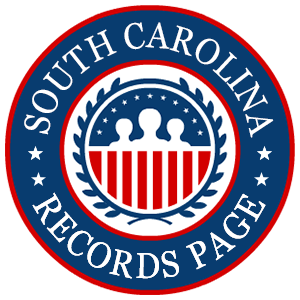Run a free South Carolina warrant search for yourself or others using this clear and concise resource.
Warrant information can help keep you safe and inform you about whether individuals in your life may be involved in criminal activity. Access to this information is also helpful if you need to ensure you do not have any active warrants that need to be handled.
The passing of South Carolina’s Freedom of Information Act resulted in access to warrant information (and related records), but knowing where to look and how to obtain these details is key.
Read this article to learn how to search for South Carolina warrants at no cost. Lookup tools, databases, and contact information for record custodians are provided to assist you in successfully finding the warrant information you seek.
This resource was written by Attorney Robert Bailey Jr, who holds a Juris Doctorate from Widener University School of Law.
The Availability of Warrant Records in South Carolina
In South Carolina, a citizen is authorized to check for warrants under the state’s Freedom of Information Act (FOIA).1
There are a variety of different warrants that a citizen can access under this statute, including bench warrants and arrest warrants. More information will be provided later on the types of warrants in South Carolina and their purpose.
While information on warrants is generally available, there may be limitations to this access. In particular, warrants can be restricted, or at least redacted, if the release of the information will interfere with an ongoing law enforcement investigation. For instance, a search warrant that reveals sensitive details that are still needed to execute a search warrant may fall under this exception.
In South Carolina, warrants are available through a variety of mediums. Some warrant information can be accessed through online search tools ranging from the state judiciary to county sheriff’s offices. This article will provide several different options for accessing warrant information throughout South Carolina.
Necessary Information & Insights To Run a South Carolina Warrant Search
If you want to find out if someone has any active arrest warrants in South Carolina, you will need certain basic information. It will be difficult to perform any warrant search if you do not at least have the person’s full name. Of course, the more information you have, the more efficient and seamless your warrant search will be.
Additional information that will help you perform a warrant search include the following:
- Date of birth
- Person’s state of residence
- The location where a warrant was issued
- Descriptive characteristics (sex, race, etc.)
- When the warrant was issued
Once you have the information for performing a search, you next need to know where to look. In South Carolina, warrant information can be found at the state, county and city levels. At the state level, South Carolina’s judicial branch provides online options for accessing warrant information.
You can also contact the clerk of court and sheriff’s office at the county level. Lastly, a record seeker may also be able to find warrant information through city police departments. As there are various types of warrants, this information may be found with different records custodians.
Most of these search options are free. However, while you may be able to access this information for free, the various agencies will usually charge fees if you are requesting copies of any warrant information. In addition, each agency may have a different process for how this information can be accessed.
Lastly, it’s important to know that you may be able to get more details by searching case records in person as opposed to the information you can readily access online. Below is streamlined information on conducting these lookups, along with the tools necessary to access warrant information in South Carolina.
How To See if You or Someone Else Has a Warrant in South Carolina (Free)
If you want to find out if you or someone else has any outstanding warrants, you can perform an online search using the South Carolina Judicial Branch’s Case Records Tool. While this is a unified case record search tool, you will have to select a specific county to begin your search.
Once you select the county, you will be provided with various options for searching case records. First, under the “case type” drop-down menu, select Criminal. Select the same under the subtype drop-down menu.
If you want to keep your search broad, you can stop there. However, there is also a drop-down menu for “action type,” where you can search specifically for bench warrants and other warrants issued in South Carolina.
After you make this selection, you can enter whatever identifying information you have, such as an individual’s name. You can also set a filing date range to narrow your results. From there, you can view your results.
On the results page, there will be some preliminary data, but to find warrant information, you will need to click on the case number to view the complete criminal record. Once you get to the complete criminal record, scroll down and click on the “Actions” tab.
Here, you can see a complete listing of all events that have occurred in a particular criminal case, from the newest to the oldest action. If a warrant was issued in that particular case, information will be listed here.
For more in-depth warrant information, you will have to contact the county court that issued the warrant. More information will be provided later in this article on searching for warrant information at the county level.
Note: If you have a specific docket number for warrant information, you can bypass the above steps and search for the case directly.
Obtain Warrant Information in SC at the County Level
In addition to using state search tools, you can also find out if you have a warrant at the county level. This may be a good option if you are looking to talk to someone directly or if you know specifically what county a warrant was issued from.
Also, you may be able to get additional information at the county level that you were not able to obtain with state resources.
Earlier in this article, there was information on how to access warrant information through the online search tools that are connected to every county in South Carolina. Below are alternative options for the three largest counties in South Carolina that may also allow you to get more information than what is provided in the online record.
The largest county in South Carolina is Greenville. To look for warrant information in Greenville County, you can contact the Criminal General Sessions Clerk of Court.2 They are the custodians of warrant information in this county.
You can contact the Clerk at 864-467-8551 or the Records Division at the Law Enforcement Center at 864-467-5278. You can also email the Clerk for criminal records to request information at [email protected].
If you want to go in person, the Clerk’s Office is open from 8:30 AM to 5:00 PM, Monday through Friday. They are located at the address below:
Greenville County Clerk of Court
305 East North St.
Greenville, South Carolina 29601
You may also want to contact the Greenville County Sheriff’s Office Warrant Services Division.3 You can reach them by phone at 864-467-5241 or go to the following location:
Greenville County Sheriff’s Office
Warrant Division
4 McGee St.
Greenville, South Carolina 29601
Richland County contains the second largest population in South Carolina. To perform a warrant search in Richland County, you have a few options.
An individual can perform a name search using the Richland County Detention Center online tool. Here are individuals who have already been incarcerated, but you can access basic warrant information related to the charges brought against the offender.
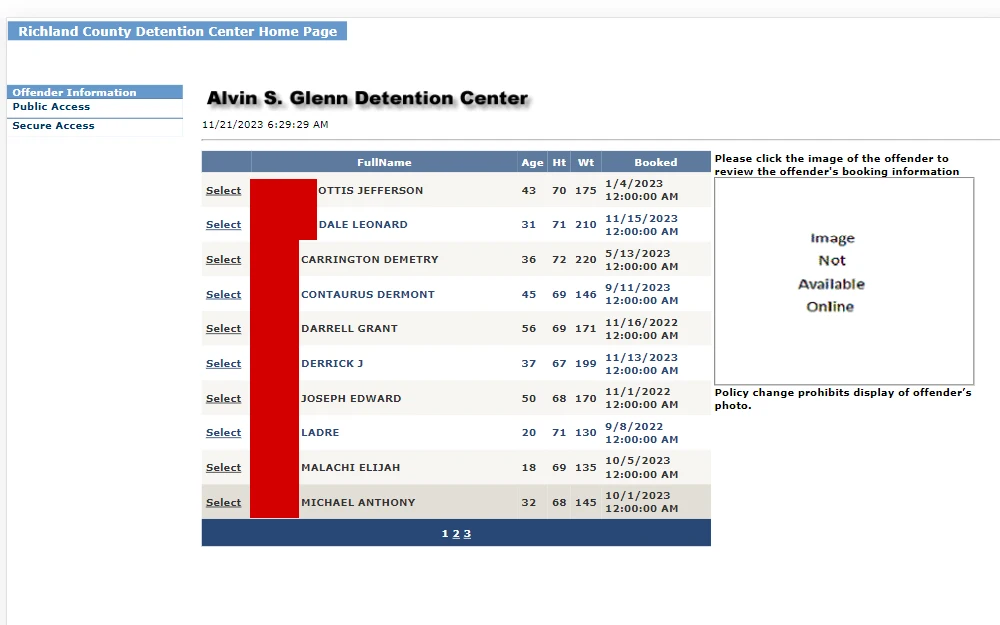
You can also contact the Richland County Clerk of Court for case records containing warrant information. You can call them at 803-576-1939 specifically for warrant information. Their main number is 803-576-1947 if you have questions about searching criminal case records for warrant information.
The Clerk’s Office is open Monday through Friday, from 8:30 AM to 5:00 PM. They are located at the address below:
Richland County Clerk of Court
Richland County Judicial Center
1701 Main St.
Rm. 205
Columbia, South Carolina 29202
Lastly, you can contact the Richland County Sheriff’s Office to inquire about any available warrant information.5 You can email them at [email protected] or call them at 803-576-3000. They are located at the following address:
Richland County Sheriff’s Office
5623 Two Notch Rd.
Columbia, South Carolina 29223
The third largest county by population in South Carolina is Charleston. Anyone can seamlessly track down warrant details in Charleston County; the Charleston County Sheriff’s Office provides its own online warrant search tool that can be conveniently accessed from the comfort of one’s home.
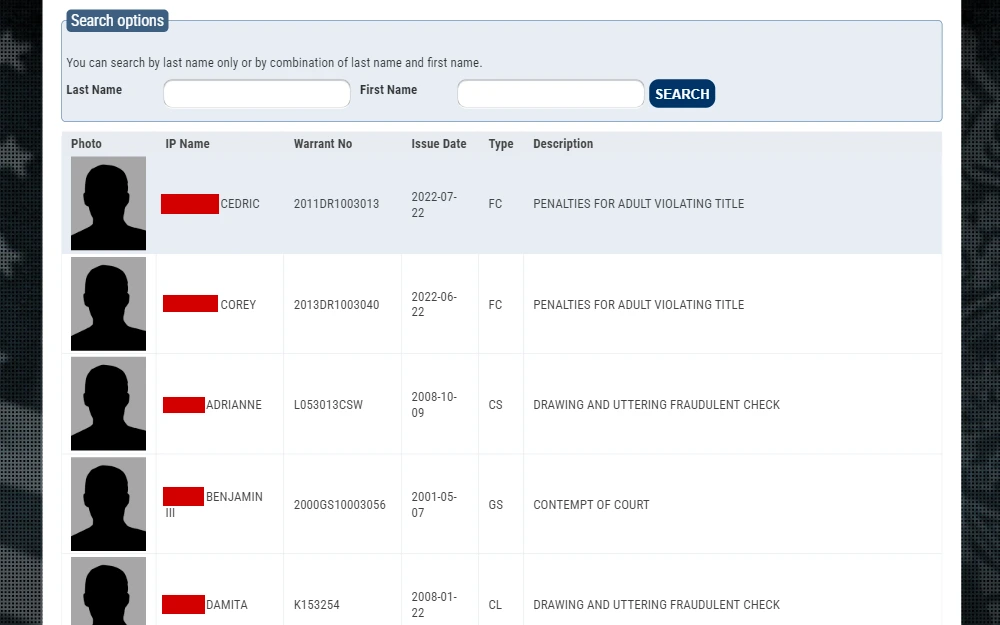
A citizen can use this tool to enter a person’s name and see if they have any warrants. Once you perform a search, you can see the person’s name, issue date, warrant number and type.
For additional warrant information, try calling the warrants unit at 843-529-7391. You can talk to someone in person at the address below:
Charleston County Sheriff’s Office
3691 Leeds Ave.
North Charleston, South Carolina 29405
If you want to view warrant information from criminal case records, you can also contact the Charleston County Clerk of Court. You can call them for information at 843-958-5000 or go to this address:
Charleston County Clerk of Court
100 Broad St.
Charleston, South Carolina 29401
Find Warrants via Municipal Agencies & Courts in SC
The last level you can drill down your South Carolina warrant search to is the municipal level; below is information on how to search for South Carolina warrant information in its three largest cities.
The largest city in South Carolina is Charleston. To find warrant information within the city, you can contact the Charleston Police Department.7 You can consider sending them a FOIA request for information or calling them at 843-577-7434.
They are located at the address below:
Charleston Police Department
180 Lockwood Dr.
Charleston, South Carolina 29403
Columbia is the capital and second-largest city in South Carolina by population. If you are looking for warrant information in Columbia, you can contact their police department’s fugitive team. You can email them at [email protected] or call them at 803-545-3162.
The Columbia Police Department is located at:
Columbia Police Department
1 Justice Square
Columbia, South Carolina 29201
By population, North Charleston is the third largest city. To access warrant information in North Charleston, you can use the North Charleston Municipal Court’s Public Portal. You can also contact the North Charleston Police Department to ask for available warrant information.
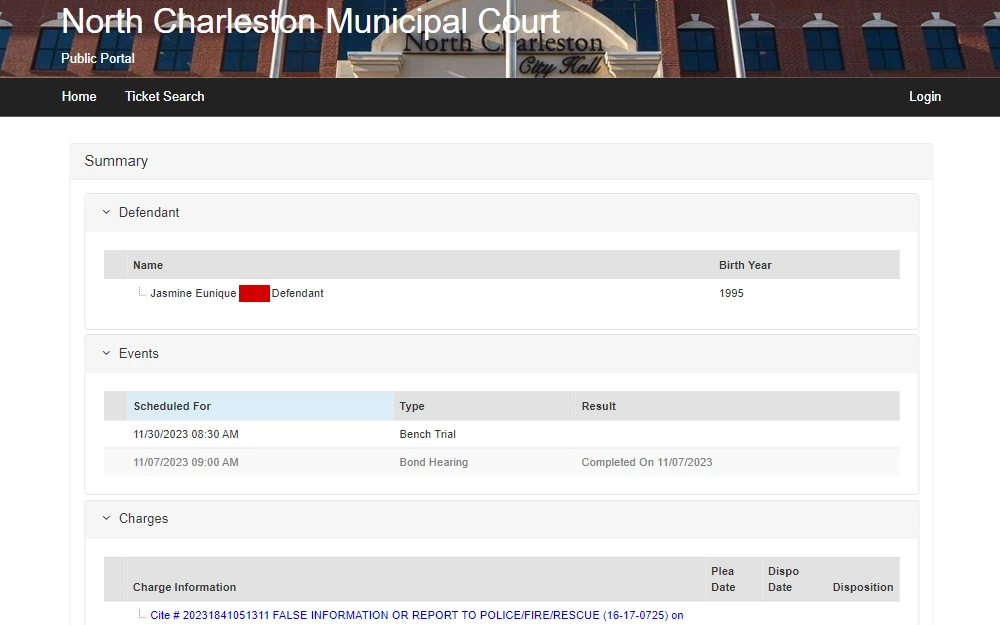
You can call them at 843-740-2800, or if you want to talk to someone in person, you can contact them at the address below:
North Charleston Police Department
2500 City Hall Ln
North Charleston, South Carolina 29418
Locate Federal Warrants Issued in South Carolina or Elsewhere in the U.S.
In addition to state-issued warrants, you may have a desire to access those issued by the federal government. These federal warrants may include criminal information in South Carolina and throughout the United States.
When it comes to online search tools, there’s a paid option. If you want to look up federal warrant information online, a good paid option is the PACER Online Case Locator. You can use this tool to perform a name-based search.
Once you enter a person’s name, you can click on a case number. After that, click on either the History or Docket Sheet Option to search for any potential federal warrants that have been issued. The cost for retrieving records is $0.10 per page.
Alternatively, you can consider submitting a FOIA request with the U.S. Marshall Service. The U.S. Marshall Service is responsible for handling the execution of many federal warrants.9 However, if you are going to make a request, it is beneficial to seek the assistance of a South Carolina criminal defense attorney who is familiar with this process.
For free information that you can access online, below you’ll find a few federal options to consider.
FBI’s Most Wanted List: This list provides citizens with access to the FBI’s ten most wanted individuals. The list provides you with descriptive information as well as background on why these people are fugitives of the law.
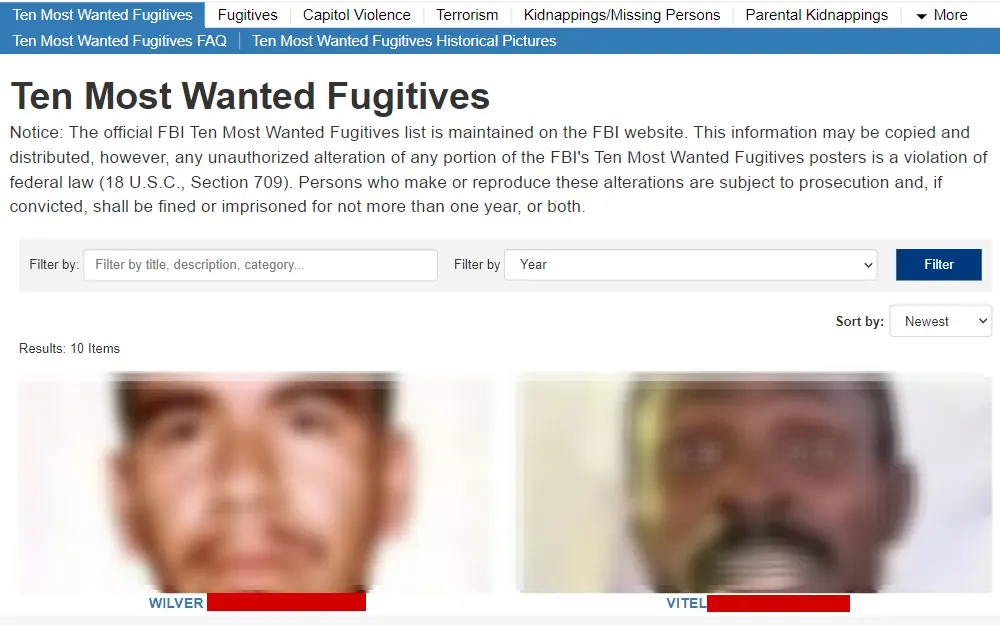
Drug Enforcement Agency (DEA) Top Fugitives: View offenders that the DEA has determined are their top fugitives for drug-related crimes.
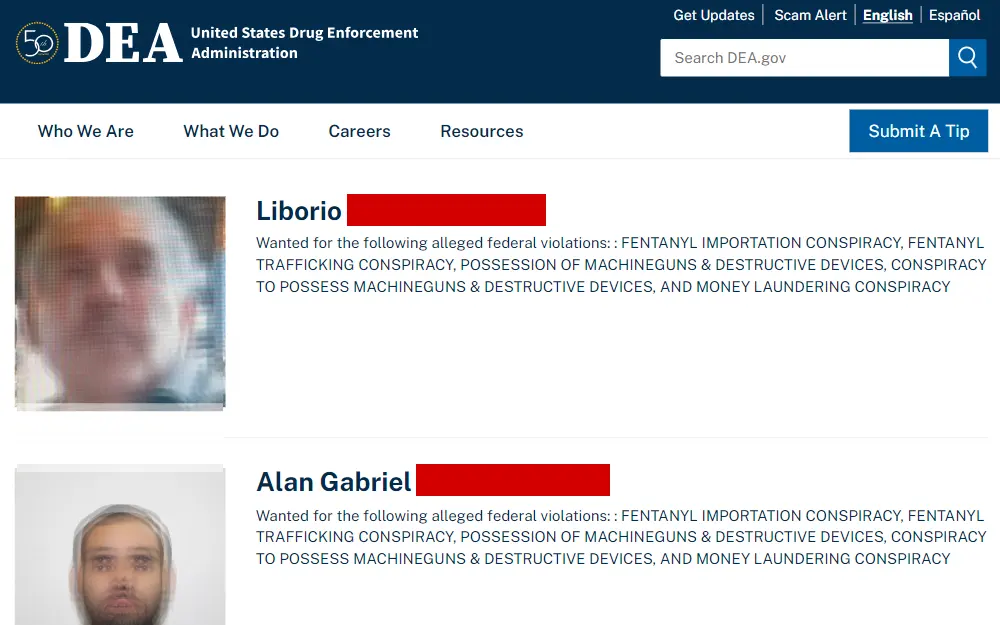
Department of Justice (DOJ) Most Wanted List: Access information on the fifteen most wanted fugitives for the DOJ. A citizen can see why they are wanted, along with detailed descriptive information to identify them.

Common Types of Warrants in South Carolina & When They’re Issued
In South Carolina, there are several different types of warrants. The difference in types of warrants is based on the action that led to the warrant as well as the function it serves.
Below is a list of warrants you may encounter in South Carolina, along with a brief description.
- Search Warrant: This is a necessary document needed by law enforcement if they want to search someone’s property (e.g., house, car, etc.). A search warrant is obtained when law enforcement can show there is probable cause that a crime has been committed in a particular area. The scope of the search warrant must be specific to the evidence presented to the judge.
- Fugitive Warrant: This warrant is used to arrest individuals who committed an offense in another state and have fled that state to South Carolina as a fugitive.
- Felony Warrant: This is a type of warrant that allows law enforcement to arrest an individual for the commission of a felony offense. Felonies are serious crimes that typically include violence. Examples of felonies in South Carolina include murder, rape, armed robbery and kidnapping.
- Misdemeanor Warrant: A warrant for arrest due to a misdemeanor can also be issued. Misdemeanors are considered less serious crimes. Examples of misdemeanor offenses include shoplifting, simple assault, trespassing and others.
- Probation or Parole Warrant: Probation and parole come with certain terms that must be followed to stay out of jail. If a person fails to comply with their probation or parole terms, a warrant can be issued for their arrest or to appear before the judge for a hearing on their sentence.
- Bench Warrant: A bench warrant in South Carolina can be issued if an individual fails to show up for a hearing or fails to comply with some other court order. Some examples are the failure to pay a fine or comply with sentence terms. This is also seen when a person is out on bail and fails to show up to their next hearing.
Note: If you see the term “active warrant” during your South Carolina warrant search, it means that it has not yet been executed or resolved.
Clearing Warrants Issued in South Carolina & Reporting Wanted Persons
Whether it’s for you or someone else, a warrant is serious business. Warrants are legally authorized documents with serious consequences for those they are issued for. As a result, you will need to consider what to do with this information after you perform a warrant search.
Through the tools provided in this article, you may find out that someone you know has an active warrant. If this occurs, it may not be wise to contact that person directly. You may want to consider contacting a friend or a family member to first notify them.
If the warrant is for a serious or violent offense, you should reach out to the law enforcement agency where the warrant was issued. They are better equipped to address the issue in a safe and professional manner.
Note: The South Carolina Law Enforcement Division (SLED) has an online report you can submit, or you can call them at +1(888)274-6372 to provide them with this information.13 You can also call the South Carolina Department of Probation and Parole to report this information at +1(888)761-6175.
Of course, you might find out that you’re the one with an active warrant. Depending on the type of warrant, you may be able to resolve the matter by either paying fines or getting a new court date.
However, if it’s an arrest warrant, resolving the matter may not be that simple. At this point, you should contact the following people:
South Carolina Criminal Attorney: They can give you advice on the process, what to do and any other nuances you need to be aware of when surrendering yourself to law enforcement.
Bail Bondsman: They can let you know how the process will work if there is an option for bail.
Family: Depending on the seriousness of the offense, you may not be able to talk to family for some time. Make sure they are aware and prepared for the situation.
Warrant information is a great resource for learning more about a person, protecting your loved ones and also understanding your own legal and criminal situation. Use the information outlined in this article for whatever reason you need to conduct a South Carolina warrant search.
For more insight into residents across the state, check out the South Carolina free public information search overview or the tutorial on accessing all SC criminal and arrest records.
References
1Title 30 – Public Records. South Carolina Legislative. (n.d.) Retrieved November 20, 2023, from <https://www.scstatehouse.gov/code/t30c004.php>
2Criminal Record Checks. Greenville County Clerk of Court. (2023) Retrieved November 20, 2023, from <https://www.greenvillecounty.org/ClerkOfCourt/CriminalRecordChecks.aspx>
3Warrant Services Division. Greenville County Sheriff’s Office. (2023) Retrieved November 20, 2023, from <https://gcso.org/team/warrant-services-division/>
4Offender Information. Richland County Detention Center. (n.d.) Retrieved November 20, 2023, from <https://www6.richlandcountysc.gov/JMSOnline/public/default.aspx>
5Contact Us. Richland County Sheriff’s Department. (n.d.) Retrieved November 20, 2023, from <https://www.rcsd.net/contact/>
6Warrants Search. Charleston County Sheriff’s Office. (2023) Retrieved November 20, 2023, from <https://sheriff.charlestoncounty.org/warrants-search.php>
7Departmental Teams. Charleston Police Department. (n.d.) Retrieved November 20, 2023, from <https://www.charleston-sc.gov/313/Departmental-Teams>
8Public Portal. North Charleston Municipal Court. (n.d.) Retrieved November 20, 2023, from <https://court.northcharleston.org/ecourtpublicportal/?q=node/395/113665>
9Contact Us. U.S. Marshals Service. (n.d.) Retrieved November 20, 2023, from <https://www.usmarshals.gov/who-we-are/contact-us>
10Ten Most Wanted Fugitives. Federal Bureau of Investigation. (n.d.) Retrieved November 20, 2023, from <https://www.fbi.gov/wanted/topten>
11Most Wanted Fugitives. United States Drug Enforcement Administration. (n.d.) Retrieved November 20, 2023, from <https://www.dea.gov/fugitives>
1215 Most Wanted Fugitives. United States Department of Justice. (n.d.) Retrieved November 20, 2023, from <https://www.usmarshals.gov/what-we-do/fugitive-investigations/15-most-wanted-fugitive>
13Suspicious Activity Report. South Carolina Law Enforcement Division. (2020) Retrieved November 20, 2023, from <https://www.sled.sc.gov/SAR_Form#:~:text=If%20you%20have%20a%20tip,CRIMESC%20(274%2D6372).>
